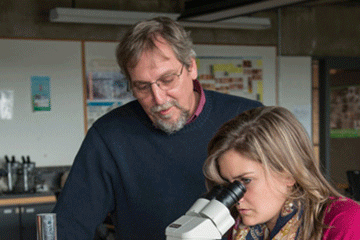Geologist Christopher McRoberts Gains a Fossil Namesake

05/05/2015
To his list of professional milestones, SUNY Distinguished Professor of Geology Christopher McRoberts can add another notable accomplishment: namesake of a newly discovered species of prehistoric, eel-like animal.
The recently named Quadralella mcrobertsi is a conodont: a tiny, extinct aquatic creature that might be related to the ancestors of early fish.
 |
| An artist has rendered what some scientists think a conodont might have looked like. |
Michael J. Orchard, a research scientist with the Geological Society of Canada, mentioned the species among a number of other newly identified conodont and aquatic flora species in an article that appeared in last fall’s Bulletin of the New Mexico Museum of Natural History and Science.
“I was quite honored to be recognized by Orchard with a new species,” McRoberts said. “I first learned about it when I received an early draft of his manuscript to review.
Orchard’s article is titled “Conodonts from the Carnian-Norian boundary (Upper Triassic) of Black Bear Ridge, Northeastern British Columbia, Canada.”
“To my knowledge, this is the first species to be named after me,” McRoberts said. “Orchard, a specialist in Triassic Conodonts, is a long-time collaborator of mine and we have conducted field work together in British Columbia, Alaska and Nevada.”
 |
| Pictured are pieces of the extinct species of newly identified conodont Quadralella mcrobertsi. |
Both have found significant specimens on Williston Lake, in the Peace River Foothills of British Columbia.
The Quadralella mcrobertsi fossil found there appears to be older than 220 million years, placing it in what geologists describe as the Upper Triassic period.
Over the years, McRoberts and Orchard have compared Triassic-era fossils of the clam-like bivalve mollusks that McRoberts studies with the conodonts that Orchard’s research focuses on.
Conodonts were soft-bodied, fish-like creatures that left very small microfossils — typically sized 0.2 millimeters long — of tooth-like mouth parts used for processing food, McRoberts noted.
Named after the Greek words for “cone” and “tooth,” the body of the animal itself might have resembled a tiny eel — just a few centimeters long — based on some very rare fossil records of the soft flesh that hosted the fossil mouths. For some scientists, the conodonts ¾ with their tooth-like structures of calcium phosphate ¾ seem to answer the question of which came first in the evolution of vertebrates: the skeleton or the teeth?
But for McRoberts and Orchard, the reason the two collaborators compare notes is to study the Earth’s age.
“A good part of my research involves using the distribution of fossil bivalve species in sedimentary rocks to delineate intervals of geologic time,” McRoberts said. “This is called biostratigraphy or biochronology.”
An accurate and precise geologic time scale permits recognition of biologic, environmental, climatic or other geologic events such as mass extinction events, evolutionary change, ancient climate change and other geologic phenomena — or their rates or global scale, according to McRoberts.
The fossil species also can be used to work out the ancient positions of the continents, he said.
McRoberts has conducted fieldwork across the globe in countries that include China, Italy, Canada, Austria and Hungary. Many scientific journals have published his work, including Science, Journal of Paleontology, Geology and Palaeogeography, Palaeoclimatology, Palaeoecology.
“I have named a few (new species) after people who have made a significant contribution to the discipline,” said McRoberts, who in 2011 received the SUNY Chancellor’s Award for Excellence in Scholarship and Creative Activities.
In the future, a group of McRoberts’ newly discovered bivalve mollusks will either be named after early pioneers in the science or more recent contributors to research on the Triassic Period or the species.
“With the material I am currently working on, I have one that will be named after Michael Orchard,” McRoberts said.
 |
| Christopher McRoberts, left, combs a beach in British Columbia with other geological scientists to find fossils that will add to knowledge about the Earth. |

